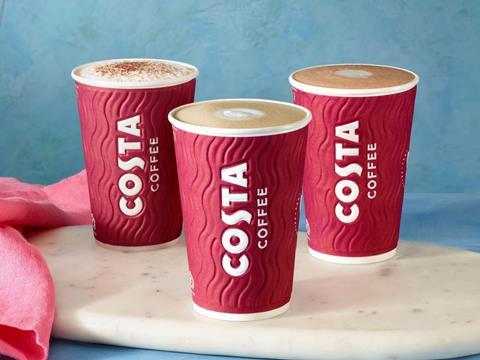
In a rush? Click here to read a short summary of this article
Introduction:
Changing regulations and consumer demand has increased the need for more sustainable ‘on the go’ options for food and drink packaging. This Brief considers the impact of consumer attitudes towards sustainability; recyclable, reusable and compostable innovations in ‘on the go’ food and beverage packaging and future plans and regulations.
Key takeaways:
- Consumer attitudes indicate sustainability is “becoming a public health issue for consumers” (Richard Cope, Mintel) and impacting their finances. Cope notes “the functionality of the packaging is more important than any sustainability credentials” it might have. There are multiple consumer behaviour considerations such as how they want to feel or be perceived using a certain product/category and what the solution needs to deliver.
- Recyclable innovations: The National Cup Recycling Scheme reports 169 million cups recycled since April 2018, reducing the cup’s carbon emissions by 50%. HSMG and H.B Fuller seek to produce a recyclable barrier solution for single-use cups, said to reduce carbon footprint impact by up to 40%. However, Frugalpac claims its research found only 10% of consumers are using specialist recycling facilities, highlighting the need for scalable solutions using current waste collection systems.
- Reuseable innovations: Street Food Box and City To Sea developed a reusable takeaway box with “100% recyclable” cutlery, a reusable napkin and washable waterproof pouch. Coca Cola Sweden and GLACIAL piloted a refillable drinks solution at PBX stores, allowing consumers to bring or buy beverage containers to fill.
- Compostable innovations: Kite Packaging developed home compostable greaseproof paper for takeaway applications; Zume launched “100% PFAS-free” moulded fibre coffee lids; and Vegware introduced moulded fibre takeaway boxes and tableware.
- Future plans and regulations: Coca Cola supports the launch of a DRS scheme in Scotland with a similar scheme planned for England and Wales from 2024. Iceland plans to introduce 100% recyclable packaging across its own-label food by the end of 2023, and Costa states its future single-use product packaging will contain at least 50% recycled content.
Conclusion:
While consumer behaviour, regulation, current infrastructure and the trialling of new systems are all factors which need to be considered, companies and organisations seem to be setting targets and taking action to drive sustainable innovation in ‘on the go’ food and beverage packaging.
Changing regulations and increased consumer demand have heightened the need for companies and manufacturers to develop more sustainable options for food and drink packaging. Many ‘on the go’ items have been created with convenience in mind but are not always the most sustainable.
According to a 2022 report by First Insight and the Baker Retailing Center at the Wharton School of the University of Pennsylvania, 76% of the consumers surveyed expected retailers and brands to be more sustainable, with 68% willing to pay more for sustainable products.
In this edition of the Brief, we consider the impact of consumer attitudes towards sustainability; look at innovations in ‘on the go’ food and beverage packaging (focusing on recyclable, reusable and compostable products and the integration of smart packaging); and how easily these aims can be achieved – for example, is ‘home-compostable’ plastic packaging actually compostable?
Consumer attitudes and behaviours towards sustainability
One point raised during the ‘Understanding and Influencing Consumer Behaviour’ discussion at the 2022 Sustainable Packaging Summit was the effect sustainability has on public health and finances. When discussing Mintel’s Global Consumer Trends 2023 survey, the research group’s senior trends consultant, Richard Cope, said:
“Part of the story we’re seeing with the data is sustainability is becoming a public health issue for consumers. Sustainability is becoming something which is hurting consumers’ finances.”
Reportedly, out of 16,000 people surveyed, the top priorities for consumers emerged as climate change and global warming, air quality and plastic pollution. The most popular consumer choices appeared to be the ones which save money, such as reducing consumption (clothes, for example) and food waste.
Also participating in the panel was Vanessa Catherine, senior brand director of global sustainability at Procter & Gamble, who stated there are three dimensions to consider regarding consumer behaviour: how does the consumer want to feel (or avoid feeling) as they are using the category; how do they want to be perceived while using this category; and what does the solution need to deliver?
However, Cope added that:
“[…] when it comes to packaging, the functionality of the packaging is more important than any sustainability credentials it might have”.
From this information, it seems that a balance has to be found between companies’ sustainability objectives and the functional properties of the products.
Recyclable innovations
In July 2022, Costa Coffee and McDonalds collaborated with Roadchef to co-fund a cup collection and recycling scheme, as part of the National Cup Recycling Scheme to increase takeaway cup recycling across the UK. The companies stated consumers could use the new recycling units at 30 Roadchef sites with the cups then backhauled via Costa and processed at facilities including James Cropper’s CupCycling facility, where they would be allegedly turned into paper and packaging.
The National Cup Recycling Scheme claims 169 million cups have been recycled since April 2018, with recycling reducing the cup’s carbon emissions by 50%.
Four months later, HSMG and H.B Fuller combined efforts to produce a reportedly recyclable and poly-free water, oil, and grease barrier solution for single-use paper beverage cups. HSMG cited a figure from Science Direct that raising the recycling rates of paper cups could reduce the impacts of carbon footprints by up to 40%.
On the other hand, according to national research carried out by ICM Unlimited in 2017, sustainable packaging company Frugalpac claimed:
“Our research found only 10% of consumers are using specialist recycling facilities.”
The company also stated “it would be impractical to provide enough separate coffee cup bins on the street to collect the 2.5 billion cups that are used every year.” Frugalpac concluded by suggesting the end goal must be solutions which are scalable, achievable with existing consumer behaviour and use the current waste collection systems.
On that note, Coca-Cola Middle East launched bottles reportedly made from 100% recycled PET across official FIFA World Cup 2022 venues in Qatar. The company said dedicated recycling bins were placed across venues and fans and volunteers educated through on-ground and on-screen communication, ensuring recyclable plastic waste was placed in the right bins for repurposing.
Qatar’s Supreme Committee for Delivery & Legacy (SC) added that plastic bottles segregated and collected during the tournament would be recycled and converted into rPET bottles in-country, in an effort to close the loop.
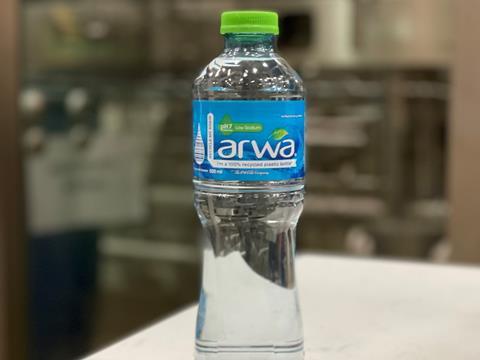
In terms of food packaging, innovation in takeaway packaging has seen recyclable and reusable products being developed. However, consumer concerns such as the return process and hygiene (when returning packaging for reuse) need to be considered.
In our feature on Zero Waste , Safia Qureshi, founder of reusable packaging solution company CLUBZERØ (which gives consumers the option of reusable packaging for in-store, takeaway or hot and cold deliveries) said consumer engagement was positive, with ‘a 95%-99% return rate’ for its packaging.
Back in February 2022, Smurfit Kappa partnered with independent packaging consultant Juozas Baranauskas to create a food box apparently made from a recyclable, paper-based monomaterial. The box was designed for Lithuanian restaurant Fresh Post and made from Smurfit Kappa’s Twin Kraft Solid Board, which the company claims absorbs mineral oils to keep food safe while retaining its smell and taste.
Reuseable innovations
In terms of reuseable innovation in 2022, Street Food Box partnered with environmental organisation City To Sea in an effort to stop plastic pollution and reduce single-use plastic in the food system through its reusable takeaway box. Street Food Box state the box is made from a patented indestructible polypropylene that is wipeable, microwaveable and dishwasher safe, enabling its reuse.
The company adds that the box comes with a set of environmentally-friendly polypropylene cutlery, a reusable, washable napkin and a washable waterproof pouch to store everything, with all items allegedly being 100% recyclable.
In October, Coca Cola in Sweden collaborated with GLACIAL bottles to launch its pilot for refillable on-the-go drinks solutions. Taking place in Stockholm at the PBX convenience store, the pilot allowed consumers to buy or bring their own beverage containers to fill, including flavours from the Coca-Cola, Fanta, Sprite, FuzeTea and Smartwater brands.
The drinks company aims to understand consumer behaviour around repeatedly refilling beverage containers, and the potential of refillable containers to reduce waste and greenhouse gas emissions.
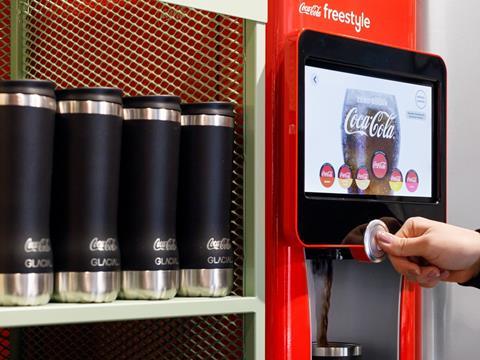
Compostable innovations
In February 2022, Kite Packaging developed home compostable greaseproof paper for takeaway applications, including wrapping ‘on the go’ meals and lining boxes for food takeaway deliveries.
The firm stated the wrapping is made from sulphite pulp-based paper fibres which apparently resists oils and fats, meaning greasy foods can be contained within the paper wrap without liquids seeping out during use. The company also claims consumers can put the packaging into domestic compost bins after use.
However, there have been questions raised about whether ‘home compostable’ packaging is actually compostable. Research conducted by University College London (UCL) as part of its Big Compost Experiment suggested biodegradable and compostable plastic packaging cannot be effectively composted at home.
The study involved 9,701 UK citizens taking an online attitudes survey, with 1,648 of them opting to perform home composting experiments on compostable plastics. Of the 902 home compost experiments completed, 55% of the results reported that the items were still clearly visible within home composting timeframes.
The research highlighted improved compostability, dedicated sorting and collection systems, and clearer communication with customers regarding the composting process for packaging as areas for future improvement.
In May, Zume launched moulded fibre coffee lids it claims are compostable and 100% PFAS-free. Zume says the lids are developed from fibres such as bamboo, wheat, straw, and various grass fibres, as well as being snappable and leak-proof. The new lids were initially rolled out in the UK, Germany, the Netherlands, Luxembourg, Belgium, Scandinavia, France, Italy, and Spain.
In November, Vegware introduced its Nourish moulded fibre range of takeaway boxes and tableware, allegedly certified for industrial composting. According to the company’s website, the tableware can be used for serving hot or cold foods up to 45°C and the takeaway boxes can be used for hot food up to 45°C.
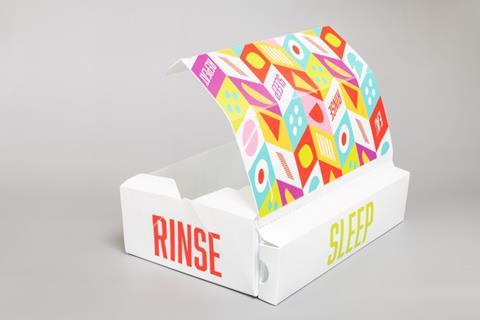
Future plans and regulations for recyclable, reusable and compostable food and beverage packaging
One of the companies planning innovation in the beverages sector is Coca-Cola, with the company’s plans for 2023 including supporting the launch of a DRS scheme in Scotland. The brand says a similar scheme is also planned for England and Wales from 2024.
Set to be implemented in August, it will require consumers to pay a 20p deposit on every can, glass or PET plastic bottle purchased, which is then reimbursed when the empty packaging is returned.
Iceland claims to have recycled 1.2 million plastic bottles through a reverse vending machine trial, and its Mumbai Street Co and Mexicana street food meal ranges are currently in paper-based trays which are fully recyclable within the normal domestic paper waste stream. It aims to introduce 100% recyclable packaging across its own-label food by the end of 2023.
Costa states its current takeaway cup (as of 2022) is made from 100% plant-based, renewable materials, adding that its future single-use product packaging for Costa items will contain an average of at least 50% recycled content.
McDonalds have reportedly switched to paper-based straws and cutlery, developed new McFlurry cups without lids and salad boxes made from card. According to the commitments outlined on its website, the brand now aims for customer packaging to be made from ‘renewable, recycled or certified sources and designed to be recyclable or compostable’ by 2024.
However, many of the future plans and targets around recyclable, reusable and compostable food and beverage packaging will be affected by The European Commission’s revisions to the Packaging and Packaging Waste Directive targets.
The Commission proposed that 20% of hot and cold beverages, 10% of takeaway food, and 10% of alcoholic beverages should be offered in reusable or refillable packaging by 2030.
It also recommended setting design criteria for packaging, creating mandatory deposit return systems for plastic bottles and aluminium cans and confirming which types of packaging must be compostable so that consumers can throw these to biowaste.
Ultimately, whilst there are there are many different factors to consider such as consumer behaviour, regulation, current infrastructure and the trialling of new systems, it appears companies and organisations are setting targets and taking action to drive sustainable innovation in ‘on the go’ food and beverage packaging.
Supporting documents
Click link to download and view these filesCosta Coffee Takeaways Cups 2022
Other, FileSizeText 0.27 mb








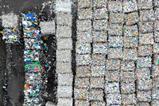
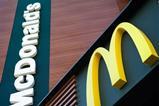
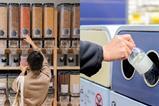








No comments yet